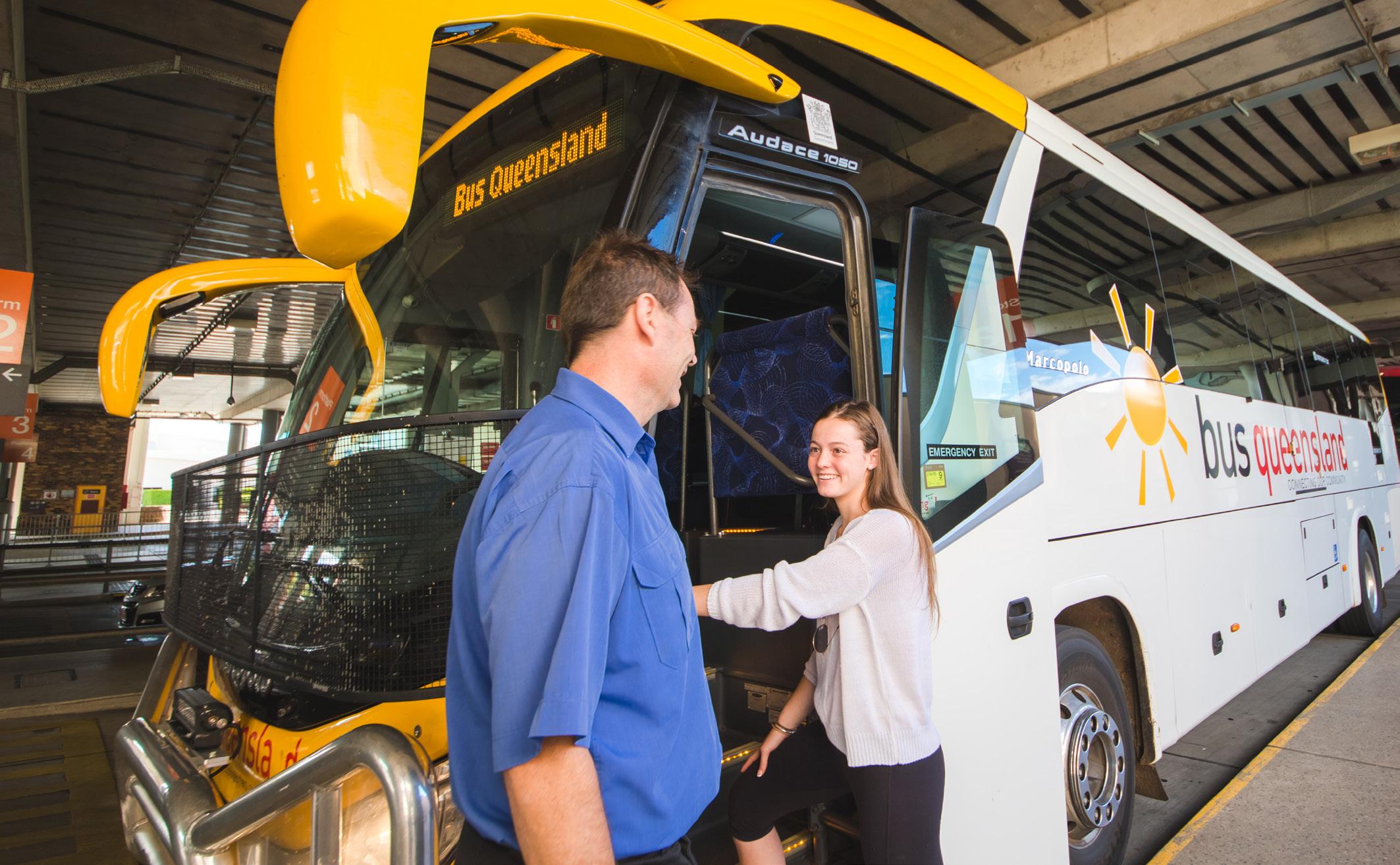
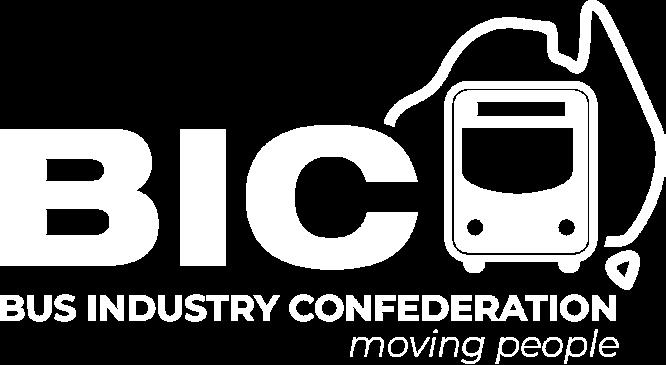

A DRIVER OF POSITIVE CHANGE








Responsible for almost 40 percent of the country’s public transport use, Australian buses and coaches stand out as a driver of positive change amidst the national push towards net zero
Writer: Lily Sawyer | Project Manager: Deane Anderton
Across the world, buses have provided a reliable and crucial mode of transport for many years, promoting social inclusion and access to education, healthcare, and employment.
Predominantly consisting of school and public route services, Australia’s bus and coach industry is no different. It has undergone significant consolidation over the past few decades, transitioning from being dominated by small, family-run companies to the national and multinational businesses we see today.
Characterised by longevity, the average Australian bus fleet’s lifespan is 25 years, which has necessitated a gradual approach in the transition towards low and zeroemission technologies to ensure economic viability and minimal disruption.
The bus and coach industry has so far been proactive in adopting various sustainable practices, steadily integrating technologies such as diesel-electric hybrids,
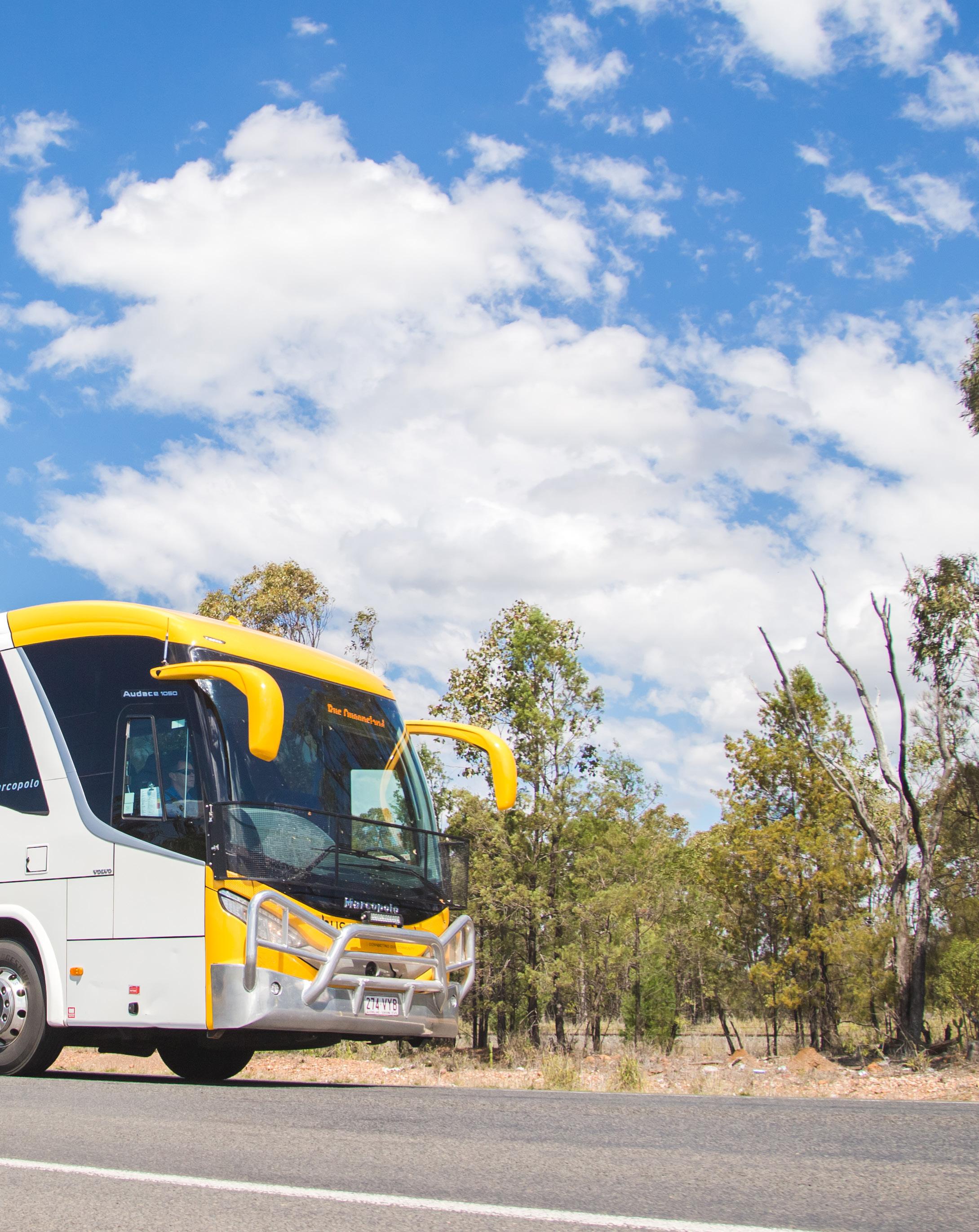
battery and hydrogen-fuelled electric buses, and lowcarbon liquid fuels (LCLFs).
This multifaceted approach helps address various operational needs and constraints, providing a robust pathway to zero emissions.
The industry also emphasises the importance of local manufacturing, supporting a viable Australian bus manufacturing sector to ensure the availability of jobs.
Additionally, workforce training and upskilling are critical to integrating emerging technologies and maintaining safety standards, whilst ensuring the accessibility and mobility needs of Australians have been identified as an equally important factor.
Overall, Australia is committed to a gradual transition towards net zero emissions across its bus fleets, implementing widespread infrastructure development and collaborating with the government on legislative policy to sustain this crucial industry.
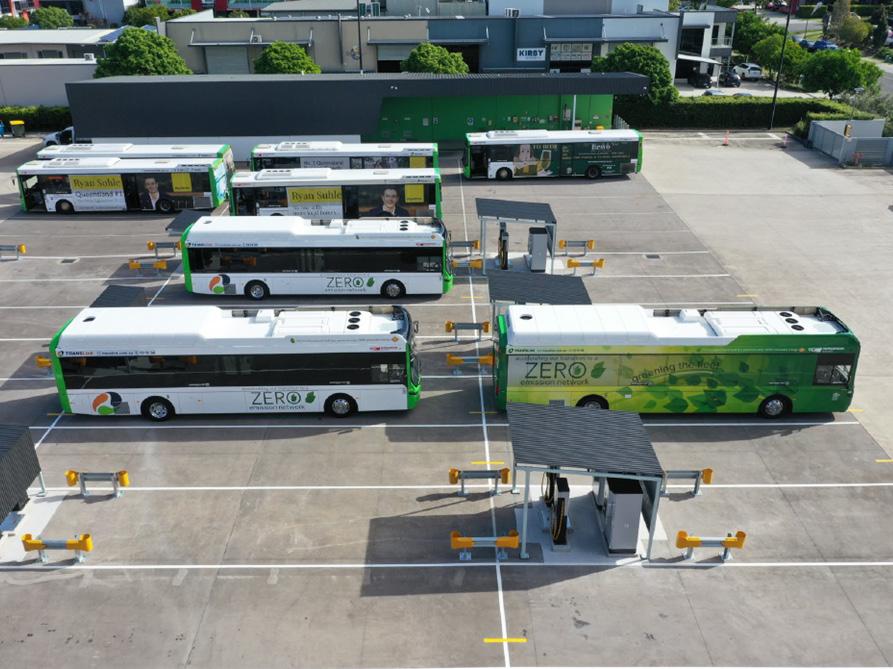
Dean Moule, National Technical Manager, and Glen Bortolin, National Operations and Policy Manager at the Bus Industry Confederation, outline the organisation’s role in enacting change across Australia’s bus and coach sector and provide commentary on the increasing requirements for regulatory frameworks around safe bus design, configuration, operation, and maintenance
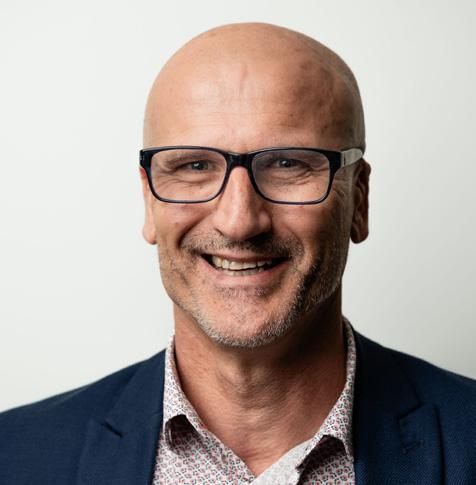
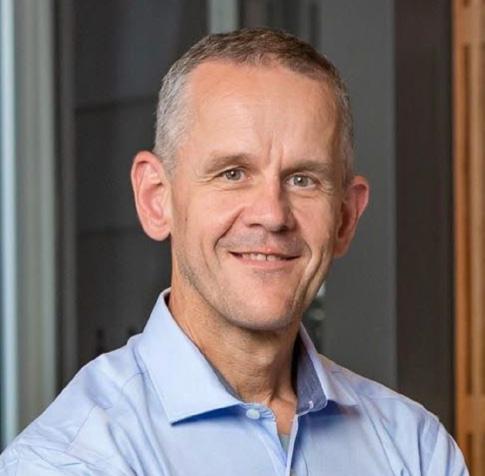
APAC Outlook (AO): Firstly, could you outline the origins and primary goals of the Bus Industry Confederation?
Glen Bortolin, National Operations and Policy Manager (GB): Established 30 years ago, the Bus Industry Confederation (BIC) is a membership association for Australia’s bus and coach industry with around 160 diverse members, ranging from operators to manufacturers, suppliers, and associated service providers, who deliver direct and indirect goods and services to the industry.
We are a national peak body that advocates on behalf of the industry with the Commonwealth government, whilst we also have association members who oversee
state-based advocacy and are made up of smaller bus operators.
Dean Moule, National Technical Manager (DM): Being a broad church in terms of our membership, we represent all sectors of the industry, from vehicle suppliers to components suppliers, service providers, or bus operators.
We see both sides of the coin in terms of bus supply and operation. Being based in Canberra, we deal regularly with the federal government on all things relative to the industry.
AO: How extensively is BIC involved in contributing to and advising on government policy and legislation that may affect the Australian bus and coach industry?
DM: We are heavily involved at all levels of the federal space in terms of advocating for the needs of our industry.
Our supply comes from all over the globe, including the world’s biggest bus manufacturer, Yutong, in China, major European suppliers such as Irizar, Volvo, and Scania, and small, local Australian family businesses.
How do we advocate in this context? We are deeply involved in developing the Australian Design Rules (ADRs), which are national vehicle standards similar to the United Nations Economic Commission for Europe (UNECE) regulations.
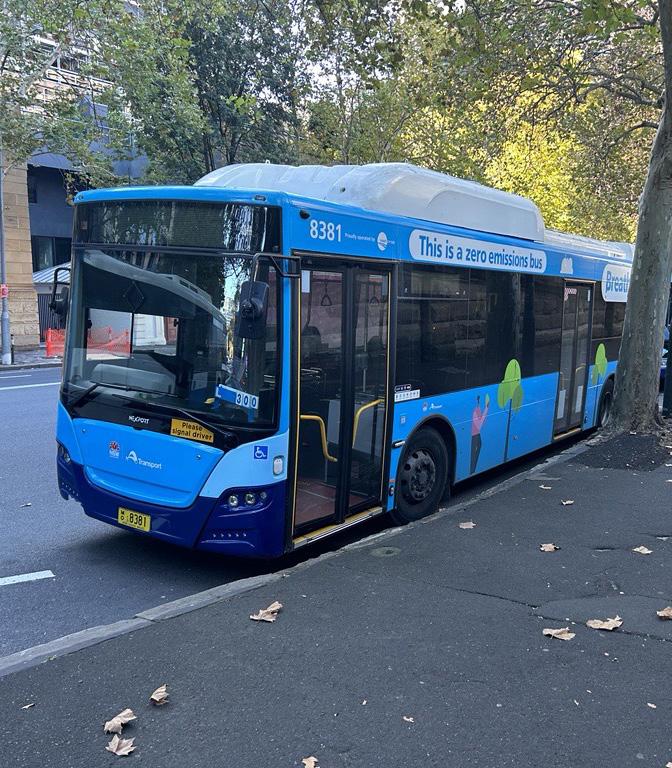
In addition, we actively discuss the on-road operation of vehicles, which also assists us in overseeing manufacturing.
We are out there trying to create a diverse environment for our suppliers, from international importers to those that manufacture from the ground up in Australia, and we like to see that diversity remain because it provides a wide choice for our market.
Supporting local suppliers is a message that we need to continually push within the government because the Australian bus supply sector accounts for less than one percent of global supply.
We are also doing a lot of work around advocating for disability standards across the sector.
Meanwhile, as the bus industry comes under the same legislation as heavy vehicles, one of our challenges is making sure we remain distinct.
This becomes particularly important when we consider the way the heavy vehicle industry is taking the lead in the transition towards net zero, even though our manufacturers, suppliers, and importers have been building zero-emission buses for some time.
BIC is actively involved in various committees to ensure the government recognises the progress the bus and coach industry has already made towards achieving zero emissions.
In 2024, the Australian government began to reform the Disability Standards for Accessible Public Transport (2002). BIC is actively participating in four of the five working groups seeking to implement this reform, which will continue to convene until a consensus is reached. These groups include:
• Reporting – Centred around developing a nonregulatory reporting framework.
• Rideshare – Seeks to implement a holistic review of the point-to-point transport sector.
• Hearing augmentation – Investigating bestpractice assistive listening systems suitable for deployment in public transport conveyances, infrastructure, and premises.
• Braille – Aims to determine final technical specifications for the grade of braille to be used on printed documents and signage.
Founded by entrepreneur Mike Whitehead in 1982, Distinctive Systems Ltd (Distinctive Systems) is an industry-leading software company designed for
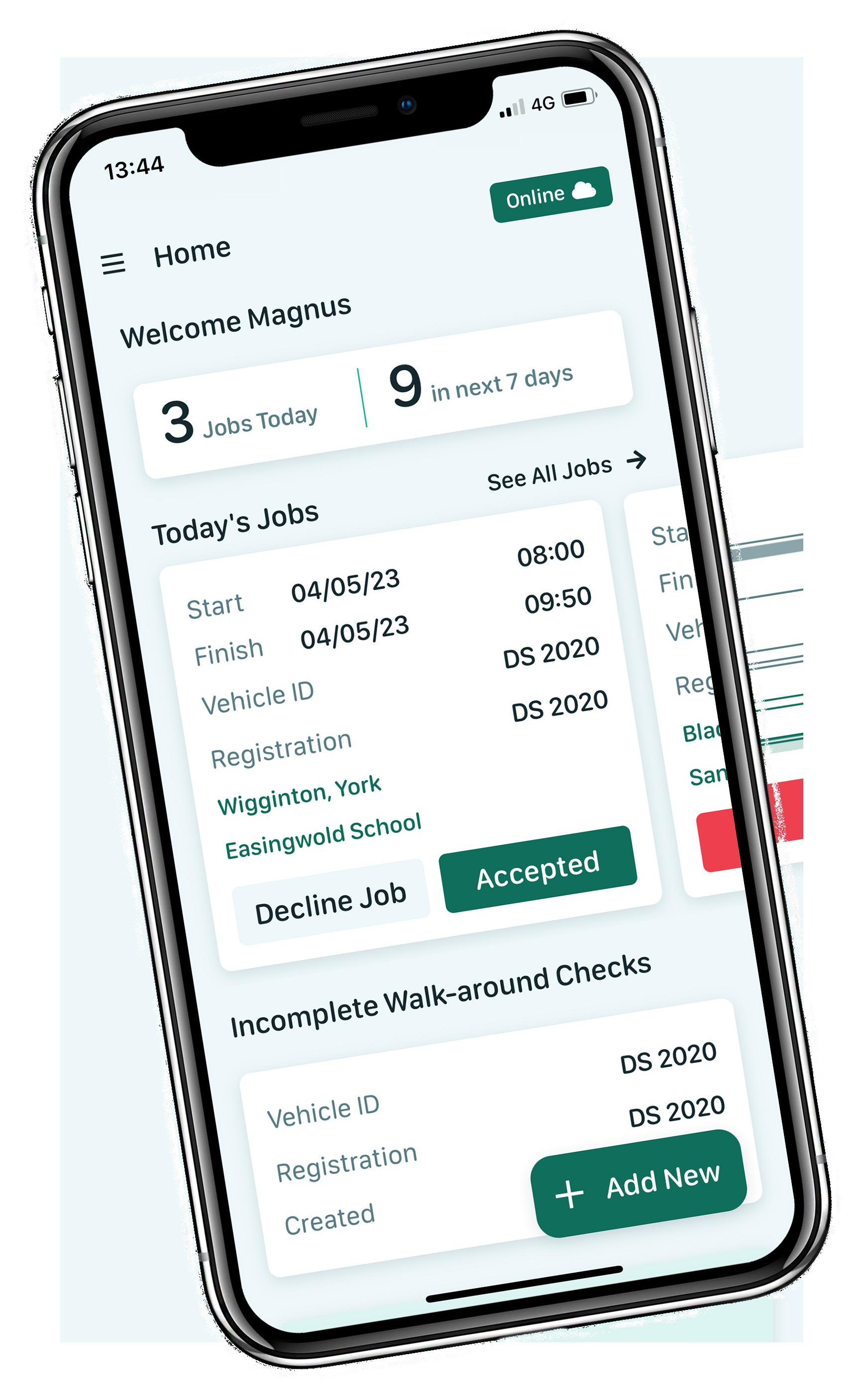
With over 40 years of experience, Distinctive Systems is the world’s leading supplier of management software, supporting clients in the daily use of over 2,600 of its latest Microsoft Structured Query Language (SQL) Server based systems. Having graduated with a degree in business in 1974, Whitehead immediately found his passion in navigating new technology – specifically that of newly emerging personalised computer technology.


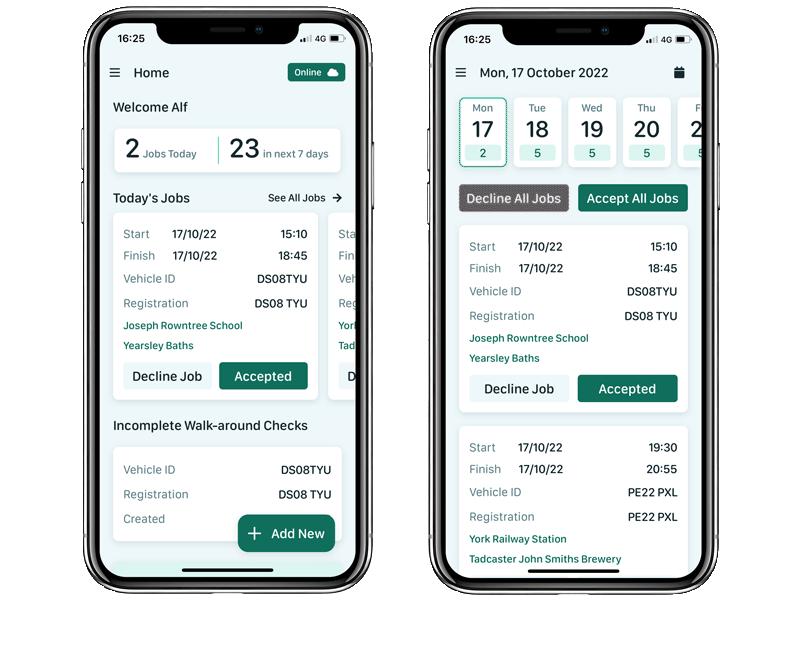



Exploring how computers could be used to build genuinely useful real-world applications, Whitehead found a way to combine this new passion with his family’s long-established coach service by computerising the management of both private charter and regular contract
This proved to be a game-changer, as other operators at local association meetings immediately showed an interest in the development of such innovative software.
Having recognised the crucial need for this industry-changing product, Whitehead embraced this new venture head-on and decided to create Distinctive Systems, travelling throughout the UK during the initial year of business to demonstrate the first-ever coach manager to various operators.
His ambition and tenacity led to success, and soon, Distinctive Systems expanded its global footprint and personalised customer offerings even further.
Over the past four decades of business, the company has grown exponentially from where it first started. Every area of business has been bolstered by the ongoing recruitment of qualified and experienced staff, with many members of our current sales and support teams having joined directly from our customer base.
This enhancement of our industry experience and engagement has allowed us to achieve more as we continue to invest back into our company for the ever-increasing benefit of our clients.
Since our inception 40 years ago, we have proudly built a reputation for providing the ultimate software for coach operators.
The depth of our industry knowledge combined with our endless dedication to working to the very highest of standards has resulted in a range of software that offers the best possible solution for any operator.
Equally, our range of software is comprehensive and includes systems for managing
coach-based private hires, regular contract work, community transport operations, gross payroll, vehicle maintenance, back office and online reservations for extended tours, day excursions, and express services.
All our systems are Windows-based and have been developed using Microsoft Visual Studio and the Microsoft SQL Server database engine. The success Distinctive Systems has accomplished is a direct result of our unique experience in both the IT and passenger transport industries.
Our knowledge of both fields has allowed us to create a range of products that get right to the core of what our clients want and use the most modern and innovative computing techniques and tools to seamlessly do so.
Distinctive Systems is proud to provide the most comprehensive systems on the market with tens of thousands of development hours behind each one; simplified express and limited capacity versions of its systems, which ensure cost-effectiveness for even the smallest of operations; and a pay monthly subscription pricing option that covers the use of its software and ongoing support.
Additionally, we offer our dedicated customer base the availability of our expert sales team with years of industry experience, comprehensive training at your own offices tailored to your type of work and staff needs, unlimited email and telephone support that covers every aspect of our client’s ongoing use of our systems provided by the same skilled team, and much more.
As an independent software vendor specialising in the development of products for coach, bus, and truck companies, Distinctive Systems offers a plethora of personalised and technologically innovative services to its client base.
One such service is the walk-around check mobile app available to any operator using our Coach Manager charter and contract booking system, Tour Booking System, or Vehicle Maintenance System.
The app, which is completely free of charge, makes it easier than ever to ensure drivers are complying with their statutory duty to carry out a daily walk-around check and report any defects found. It acts as a guide for the driver throughout the complete process of performing the check, ensuring it is conducted accordingly.
Additionally, we offer Coach Manager, Tour Booking System, and Vehicle Maintenance System operations.
Coach Manager is a start-to-finish solution for the management of private charter and contract work specially designed for coach, bus, limousine, and community transport operators that has seamlessly handled approximately 120 million journeys to date.
Distinctive System’s Tour Booking System is a complete management solution for individual passenger reservations on tours, sightseeing trips, and express services that has proudly handled bookings for more than 14 million passengers.
Finally, our Vehicle Maintenance System is a workshop management package specially designed for coach, bus, and truck operators. The software provides defect reporting, statutory inspection planning, scheduled and unscheduled maintenance activity management, job cards, history recording, and workshop control.
After over 40 years in business, our commitment to our clients is stronger than ever.
Despite the abundance of new enhancements that we’ve brought to our systems in recent years, Distinctive Systems has even more exciting and significant developments in the pipeline, sure to keep us at the top of our game for many more decades to come.

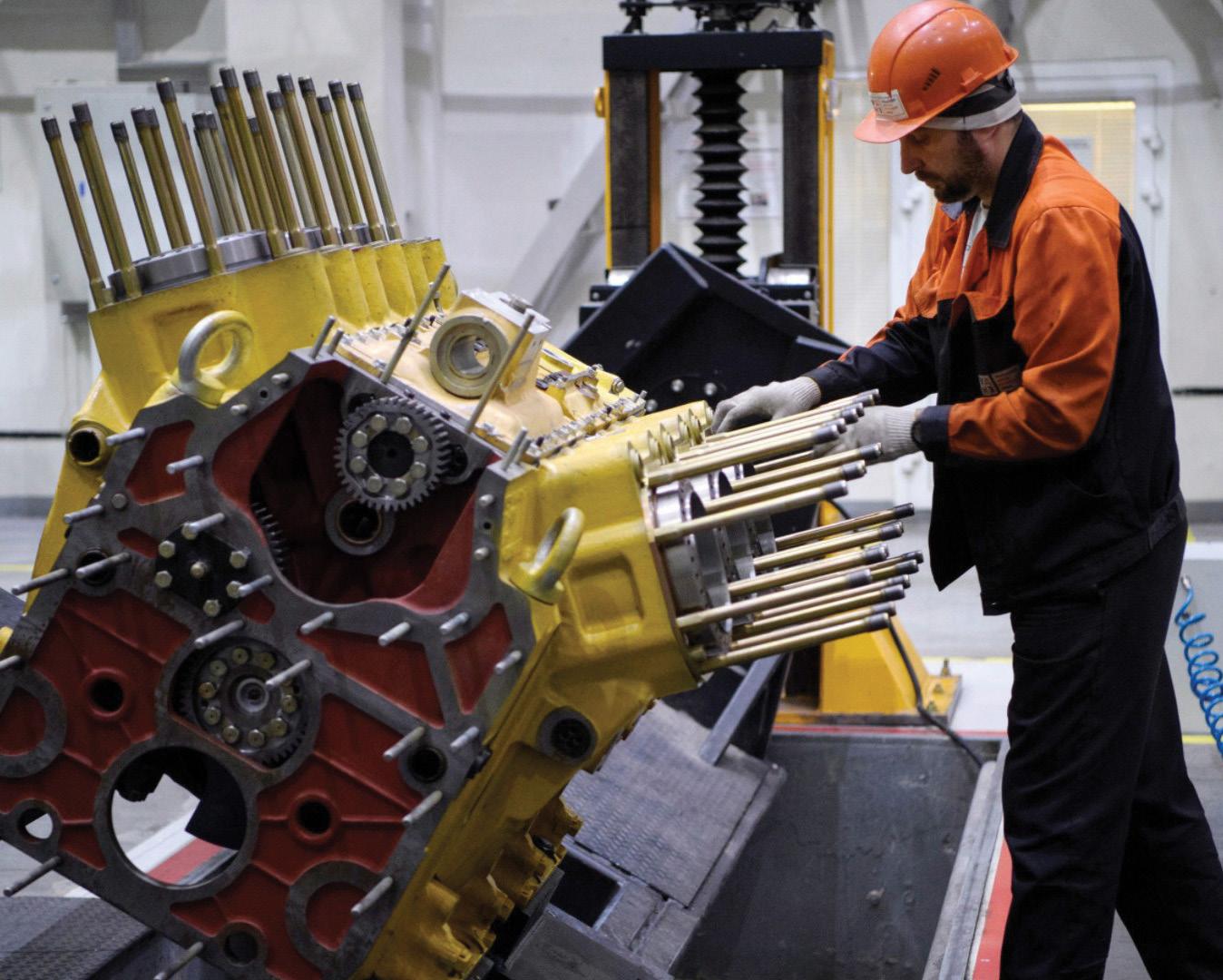
We support the upskilling of existing staff, and we want to ensure the rules the government brings in around regulating electric vehicles (EVs) in the sector support what we have already put in place in terms of prioritising safety and positively impacting the environment.
AO: Could you talk us through your recent developments in decarbonisation? What are your hopes for a more sustainable transport future for Australia?
DM: Most state governments in Australia have made announcements on the future purchasing of zero-emission public transport, primarily EVs, and are agnostic to the technology being used, whether it be hydrogen or fuel cell-powered electric buses.
We are trying to assist in this policy space, but one of the challenges we have faced is that the transition to net zero is expensive. We have seen some jurisdictions extending the life of their existing vehicles and prolonging the fleet’s lifespan to help offset the upfront capital cost of purchasing a new zero-emission EV.
However, this has created problems for manufacturers. It is a lot easier for all suppliers to be sustained when there are fewer peaks and troughs, and extending the life of vehicles in this way can be challenging because it creates an ‘order drought’, making it difficult for suppliers to justify viability.
Therefore, something we are strongly advocating for is long-term volume planning to sustain local manufacturing. Currently, our sector employs 10,000 people directly and indirectly in the supply of vehicles to Australia –
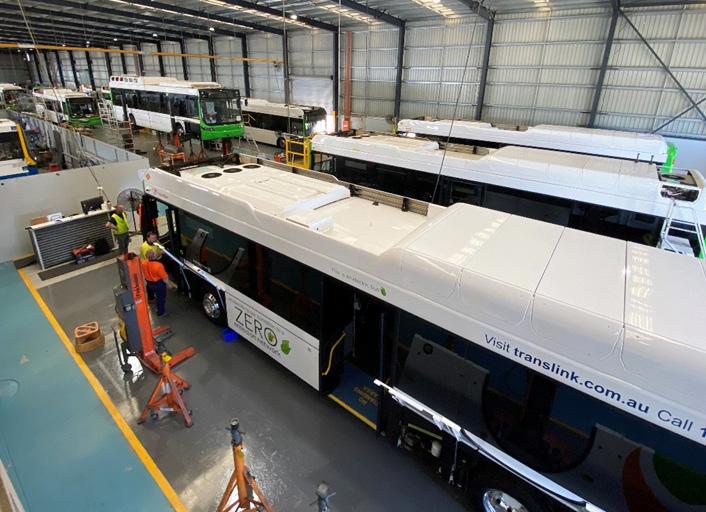
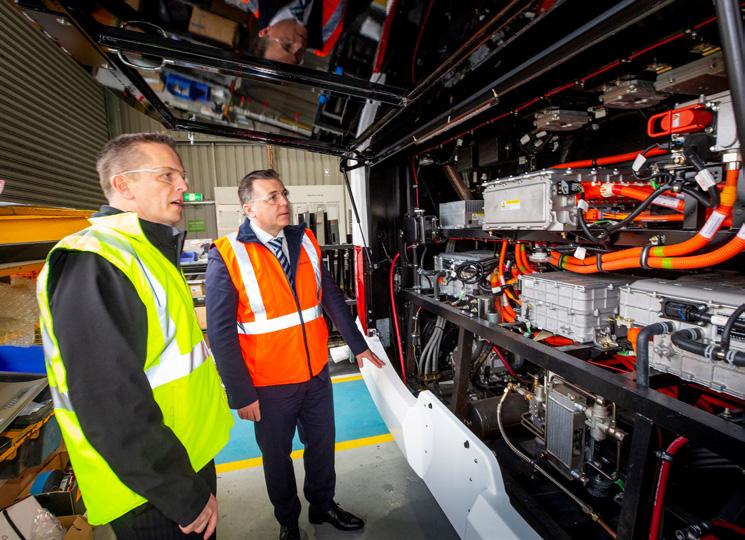
“WE SUPPORT NATIONAL HARMONISATION AS IT BRINGS DOWN SUPPLY COSTS AND INCREASES QUALITY, SUSTAINING THE FUTURE OF THE INDUSTRY”
– DEAN MOULE, NATIONAL TECHNICAL MANAGER, BUS INDUSTRY CONFEDERATION
whether that is importing, manufacturing, or assembling. That is an AUD$5billion dollar contribution to the economy, which we want to sustain.
The other challenge we face is with the bespoke nature of bus supply. Currently, each vehicle is hand-built and tailored towards customers’ unique specifications, which means redesigning the same piece of gear multiple times to address these various requirements.
This will present a major obstacle as the industry seeks to build more harmonised products on a national scale. We support harmonisation as it brings down supply costs and increases quality, sustaining the future of the industry.
In terms of environmental sustainability, many of our organisations are already engaged in practices such as utilising battery energy storage systems (BESS) for EVs. The government is beginning to see this progress and acknowledges how the bus industry supports a green future.
The other challenge we face in the transition to net zero is competing on a global scale. As I said, we are a
small part of a global footprint, but we also have leading suppliers here who build world-class products, some of which have been in the past, exported overseas to the United Arab Emirates (UAE), Singapore, and New Zealand. We would like to see this continue, but the high cost of competing on a global scale is a key consideration for the government. This can be challenging as you have one arm of the government concerned with value for money and the other looking to retain local jobs – the two do not necessarily see eye to eye.
AO: How have you seen the Australian transportation industry evolve over the years?
DM: From a manufacturing perspective, since I began in the industry 39 years ago, I have seen it transition from a series of many smaller family businesses and evolve into something that is on a more sustainable, national scale. At the same time, we are also seeing globalisation take hold. 20 years ago, I would say 95 percent of Australia’s vehicles were manufactured in the country, whereas now it is only around 65 percent. Again, that is fine in terms of diversifying our supplier base, but it does mean our products are now not only competing nationally but globally, which is challenging.
In this regard, we have policies in place to support local industry and address the challenges it faces. Australia’s various states and territories also have different policies on what is needed to meet local (state) content requirements, retain local (state) jobs, and keep suppliers and businesses running. This is challenging for any supplier to manage.
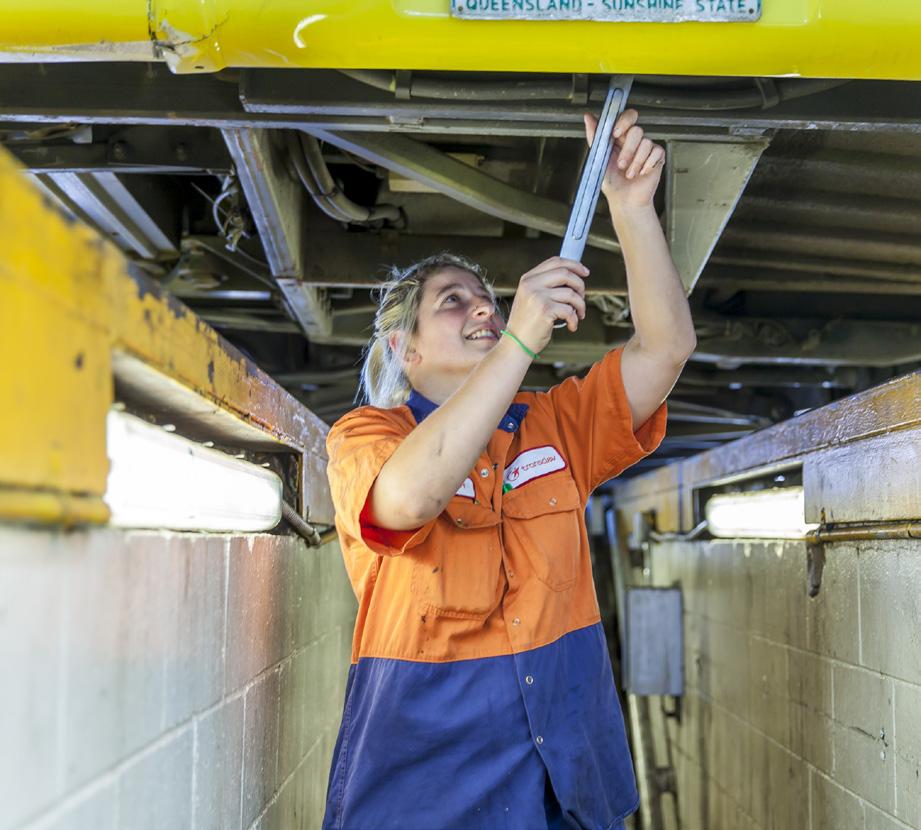
In July 2024, BIC published a policy paper, Driving Towards Zero Emissions, which seeks to provide a comprehensive roadmap for the bus industry to achieve zero emissions whilst ensuring economic sustainability and minimal disruption. Key aspects include:
• Industry choice – Emphasising that bus operators should have the flexibility to choose the right technologies based on specific routes, tasks, and regional characteristics.
• Role of LCLFs – Highlighting LCLFs as a crucial component in the transition to net zero, particularly for existing and ageing fleets and in areas where electric infrastructure is insufficient.
• Diverse technological solutions – Supporting a mix of technologies such as diesel-electric hybrids and battery and hydrogen-fuelled electric buses to meet various operational needs.
• Collaboration with governments – Advocating for coordinated efforts between federal, state, and territory governments to support the transition through harmonised policies and programmes.
• Infrastructure development – Calling for investment in necessary infrastructure, including depot upgrades and charging and refuelling stations.
• Support for local manufacturing – Promoting a viable Australian bus manufacturing industry to ensure the availability of low and zero-emission buses.
• Phased transition – Recognising the 25-year lifespan of buses, supporting a gradual transition to ensure economic viability and minimal disruption.
• Workforce training – Emphasising the need to upskill the workforce to manage new technologies and ensure safety.
• Public engagement – Building public understanding of the benefits of transitioning to low and zero-emission buses.
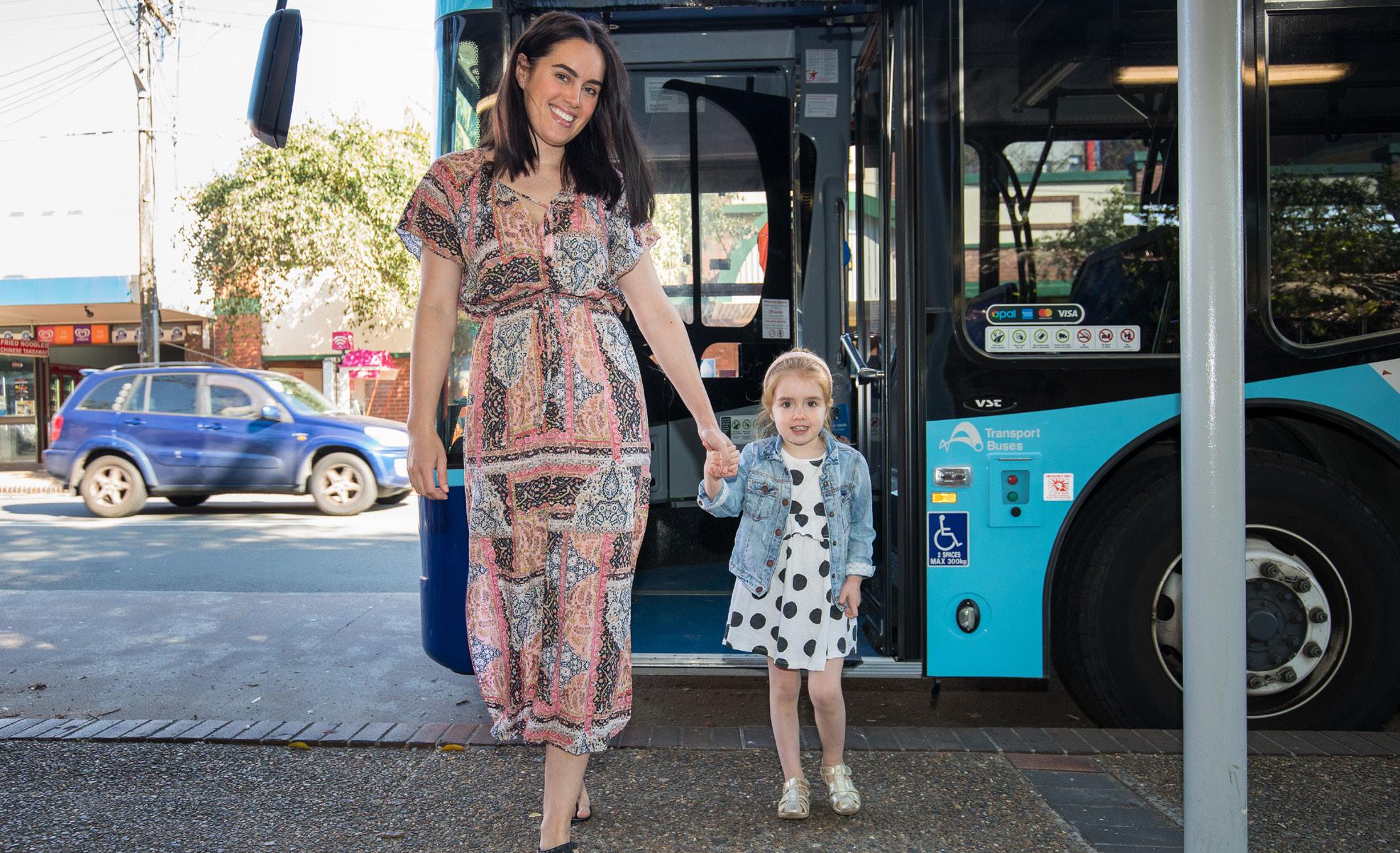
Currently, these policies are not harmonised nationally, so we are supporting the development of a strong Australian industry with harmonisation at multiple levels of the supply chain, all the way down to vehicle specifications and how local content is viewed.
AO: Are you optimistic about the future of Australia’s transportation sector? What are BIC’s goals for the future and beyond?
DM: We are looking to ensure that we have better long-term volume planning for vehicle purchases across the country.
As such, we are aiming to harmonise state government purchases to assist our suppliers, manufacturers, assemblers, and importers to a greater extent by providing volume certainty and enabling them to look five steps ahead rather than one, in addition to improving economies of scale to support job creation.
Over time, we think harmonisation will involve having one central site producing better outcomes rather than lots of microsites, which may not be easy to begin with but will achieve longer-term sustainability for the industry.
GB: Another thing we want to see is a future where people opt to use buses rather than cars – building fewer roads but putting more buses on them.
Buses are the silent workhorse of the industry; every time a train or tram so much as sneezes, bus replacement
services come in to save the day. Buses provide a more cost-effective, long-term, reliable, and flexible solution for the industry than any other mode of public transport. For this reason, we account for almost 40 percent of the country’s public transport usage.
Trains can only travel on a track, but buses can transport anyone, anywhere. This is why we think it is a superior mode of transport, and encouraging a widespread shift towards buses as the preferred mode of public transport is what we’re striving for.
AO: Finally, what initiatives do you have in place to safeguard the future of the industry, from addressing skill shortages to integrating sustainability?
GB: We have just launched a retention and recruitment project to address how we should not only recruit new bus drivers but retain existing ones. We are seeking younger people and gender diversity as we want to get more female drivers into the industry.
However, due to the anti-social behaviour that our bus drivers can unfortunately sometimes experience onboard, we are grappling with how to achieve this.
DM: We are looking to attract people across various roles, from bus drivers to mechanics and electricians. It is all about making the bus industry a destination career choice, not just something that people fall into.
Moreover, the industry today has changed from 20 years ago as most of our time is now spent with computers, which attracts more employees.
Diversity is certainly important across all levels. We want to recruit as many genders, cultures, and identities to our industry as possible because the consequential benefits of having a more diverse workforce will allow us to grow organically.
Elsewhere, we are navigating the smooth transition towards more sustainable technologies, renewable fuels, and low-carbon liquid fuels. We are dedicated to finding the right technology solutions for the right application, which is reflected in our net zero policy.
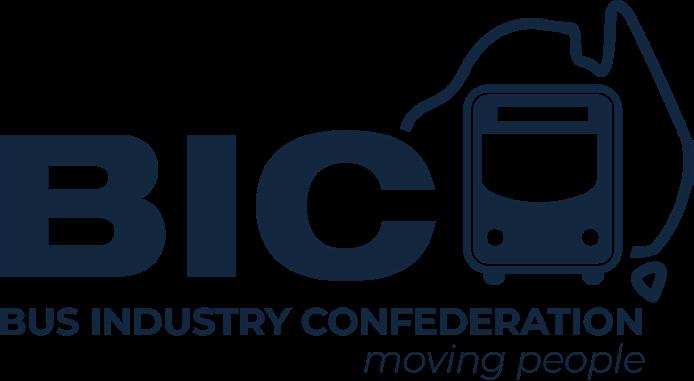
Tel: +61 (2) 6247 5990 services@bic.asn.au communications@bic.asn.au https://bic.asn.au/
• Vision – To develop an innovative and thriving bus and coach industry that moves people safely and sustainably.
• Mission – To be a national united voice that builds industry capability and advances the interests of members and passengers.
• Goals –
• Represent the business interests of the bus and coach industry.
• Promote the widespread use of buses and coaches.
• Encourage funding and investment.
• Promote the contributions made by the bus and coach industry to Australia’s economy, society, and the environment.
• Ensure the bus and coach industry is treated as a separate entity within the Heavy Vehicle National Law.
